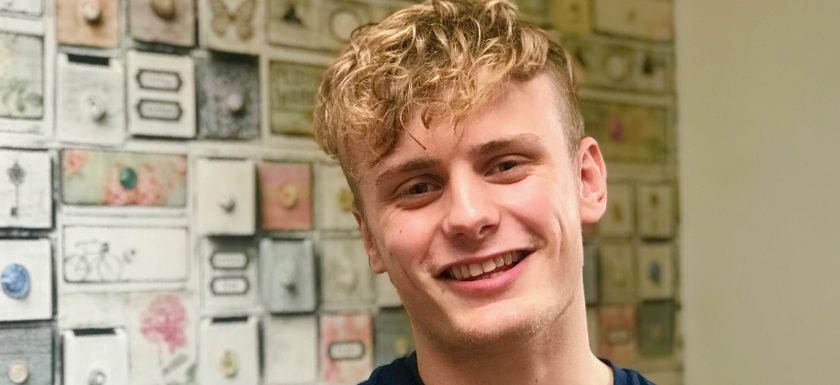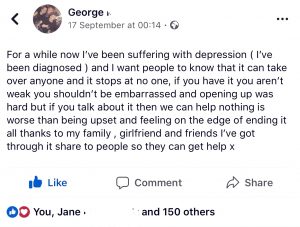
“I’d say it all started when I was playing rugby for Leeds Rhinos Under 16s and I got a serious match injury from a bad tackle. All of a sudden, you can’t do anything for months. Yeah, I think that’s when it started. You want to play rugby, you want to get out and about and you can’t. It drives you mad.”
I’ve met up with 19-year old George today to talk about his diagnosis of depression earlier this year following a three-year struggle with anxiety and low self-esteem.
“I felt blank, like I was in a hole. I had nowhere to go.”

“When I broke my ankle, I played rugby at quite a high level, and I’d started to think that maybe I could do this as a career. And when you get thrown out of your way like this it’s awful, isn’t it? You’re sort of losing your goal. I couldn’t see anything else I could do instead. “
“I felt blank, like I was in a hole. I had nowhere to go. I was just getting up out of bed every day without anything to aim for and the days were just rolling by, and I had nothing to do.”
“And school didn’t help. I didn’t want to be there. I wanted to leave. So, I was constantly doing what I didn’t want to do. The things I wanted to do I couldn’t. And at the start of this year, it just got on top of me.”
“Then there was a breaking point where I just burst.”
“I think my parents noticed it slowly getting worse and worse, that something was up rather than it just being the occasional bad mood.”
“Yeah, and then there was a breaking point where I just burst. I think it was when I saw these guys I’d played rugby with on TV. They’d never been as committed as me with their rugby, ate junk food, tried to get out of training. I’d always trained, worked really hard and looked after myself. And then these guys had made it, and I hadn’t.”
“It felt like working hard got you nowhere, was sort of pointless. I suddenly felt that there was no point in anything anymore. That made it all like explode in my head.”
“It was always at the back of my mind that I wasn’t good enough.”
After the injury, did the club say that his career was over?
“No, that was the frustrating thing. They spoke to my mum and dad and said I could potentially go further. But, when you’ve had such a bad injury and all the operations on it and that, your confidence as a person sort of goes down. I wasn’t the same.”
“So I took a break from rugby altogether for nearly a year and then went back to my amateur club to start playing again. But, it was always at the back of my mind that I wasn’t good enough. It was just so frustrating. Self-doubt had taken over massively.”
“I’d always had some low self-esteem, I guess. When one of my coaches said something good to me, I didn’t believe it. But when someone said something bad, I did believe it. I always only took the negative stuff on board and not the positive stuff. I just didn’t believe it. I just didn’t believe in myself at all.”
“You feel you can’t be yourself because then nobody wants to hang out with you.”
Where does he think that self-doubt comes from?
“I don’t know, I was always right quiet as a kid, and when you play in a rugby team, there were always the loud lads. Their confidence and ego made me think, ‘why aren’t I like that?’“
“When you’re young, you think these people are amazing. And you want to be like the people that are showing off because everybody thinks they’re great and that their lives are amazing.“
“And when you feel you can’t be yourself because then nobody wants to hang out with you, you sort of start to think that you’re no good from quite an early age on. That’s what I thought then.”
“It’s as real as a physical illness.”
How did people generally react when he told them about his feelings earlier this year?
“My mum was great, and it was easy to talk to her. I think we’re more alike, kind of emotionally. I found it difficult to talk to my dad at first. I think it’s the ‘man thing’.”
“You feel that as a man you cannot talk to other men about things like this. But I now know that that’s rubbish. My dad is great as well to talk to now. I was lucky really. My parents didn’t even question whether this was real or not.”
“I think it can be kind of difficult to get people to believe you as you can’t see when somebody is unwell mentally. If you break your leg or have cancer, people have sympathy with you, but with mental things, you often hear ‘pull yourself together’ which is totally wrong because it’s as real as a physical illness. You want to get out of it but you can’t. Nobody wants to feel like this.”
“My GP was great. Maybe she’s had a lot of experience with depression from other patients or from somebody close to her. I felt that she knew what to do and say. And she took it seriously. I’m going to see her again soon to see how I’m getting on.”
“I realised that I have to talk about it to get it all out of me.”

How did it make him feel when he was diagnosed with depression?
“At first, I thought how come it’s happened to me and that I was the only person. So you feel like a bit – I wasn’t annoyed – but I thought why has it got to be me, why can’t anything be going right for me?”
“But then, obviously, I noticed a lot of people have it. I realised that I have to talk about it to get it all out of me and that I need to take positives out of it so that I can help other people and that.”
“Now, I actually think the process I’ve gone through has made me stronger as a person. I feel like I’ve actually got a bit of confidence from it. Once you know what you’re up against, you can sort of tackle it. It’s given me back my focus.”
“I also want to be a bit different now. I’ve started to wear sort of ‘dodgy’, out-there shirts into town to stand out a bit. I’ve got to 18, 19, and I thought, ‘right, you’ve just got to be yourself and if people like you then you know they’re proper people and if they don’t then – well.’“
”There’s no-one ever who is liked by everybody if that makes sense. I’ve come to realise that if people like you, they’re the right people for you. So, you might as well be you as a person.”
“People can help you, but you also have to work it out for yourself. It’s a combination of both.”
Has he had therapy to get him to this way of thinking?
“No. I think I’ve worked that out myself, and my family, friends and girlfriend have helped a lot.”
“People can help you, but you also have to work it out for yourself. It’s a combination of both. If you find the right people around you, then that helps you with becoming the person you want to be.”
“It took a while before I could tell my girlfriend, as she’s two years younger than me and I didn’t want her to put up with that at first. But when I told her, she’s been proper good, and she stuck with me. I’m really lucky because I think a lot of girls her age would’ve left. I’ve known her for eight months, not that long, but I think she’s part of the process of making me more confident and making me talk about it. It’s good to have her views as well.”
“I’ve put it on my Facebook profile so that a lot of people know.”

Why did he write the Facebook post?
“I was talking to one of my mates who I’d known for a long time, and who’d suffered from similar stuff as me. He talked to me but didn’t want to talk about it with anybody else. When I asked him why he said ‘I’m just too scared.’”
“So I said ‘if you don’t want to do it, I’ll do it’, to show him that it wasn’t anything to be ashamed of. And afterwards, another lad I’d played rugby with a few years ago then spoke to me in private saying ‘thank you, I suffer from the same kind of things.’”
“What hurt me though when I talked to him was that he was too afraid to tell even his parents.”
“I guess, a year ago I wouldn’t have told many people about my depression either, but then I did and now I’ve put it on my Facebook profile so that a lot of people know. And I’m ok with that. I can walk into public places where I know that people know me and that I’ve got it, and I don’t care.”
“I made the post to show people that you should be able to talk to whoever you want about your feelings. I would hate to think I couldn’t talk to anybody. I just think it’s sad that some feel they can’t do that. I basically wanted to help by bringing it out in the open to encourage people to talk about how they feel.”
“It’s other people that bring you, like, happiness, and if it was just you, you’d get lonely. You need other people around you to be as happy as you are. So you should want to help other people to get there.”
“I talk to people a lot. And I take myself off to my room and just listen to music.”
How is he managing his depression? Does he use any strategies?
“I take medication at the moment, have been since June this year. It makes me feel less up and down. It’s nice when you’re on the up, but it’s really bad when you’re down. So the medication evens it out more.”
“But eventually, I want to learn to cope without the tablets. Because once your own mind can help you, you don’t need them anymore. They’re just a temporary help to get there.”
“Mostly, I talk to people a lot. And when I’m in one of my dark moods or get agitated or angry, I take myself off to my room and just listen to music. That takes me to another place, I can take a step back, and it calms me down. So, I do this a lot. It really helps. Or, I just close my eyes, and that helps me relax.“
“I go to the gym, and that gives me a focus. It’s like burning it off. If you’re sitting around all day or whatever, you feel, – well I personally feel – like I’m locked in a cage kind of. Physical activity releases you, doesn’t it?”
“When I start writing about music that gives my confidence a real boost.”

“I also write a blog on Indie music and stuff. Again, this kind of takes you a step back, and talking about music makes me forget about stress. Music makes me happy.”
“And you can identify with the lyrics. That’s why Indie Music is so great. It’s not like rubbish pop music that’s just about random, shallow stuff. Indie musicians write about their lives and real stuff. They tell you what they’ve been through and you can think ‘yeah I know how that feels.’ It’s identifying with them that’s so great.”
“When I start writing about music and seeing people I don’t know, also from other countries, replying to me, sometimes disagreeing with me or just liking my stuff, it’s just so interesting and gives my confidence a real boost.”
“You’ll be surprised how many others there are that are the same as you but were too scared to talk about it.”
Has he got a message for other people with depression in a similar situation than him?
“Yeah, definitely. Talk about how you feel. You’ll be surprised how many others there are that are the same as you but were too scared to talk about it.”
“Talking helps you and others to deal with depression. Too many people kill themselves because they’re keeping it all in, and they think they’re alone.”
“You’ve got to say: ‘No, I’m not ok, and I’m going to talk about it!’”

Author’s comment:
George has made it his mission to get others to talk about how they feel because he’s experienced how much it helps with his depression.
Please share your thoughts with him by commenting below.
If you are, like George, an amateur rugby player with mental health issues, you can find help in the public Facebook Group, set up by James Griffin: “Talk Outside Of The Scrum”
Do you have an inspirational story to tell? Why not take a look at our Contributor Page and get in touch!
Thank you,
Caren 

Caren is a qualified and experienced digital copy & content writer with both a corporate and small business owner background. She runs KreativeInc Agency, a web design, development and content creation agency with her autistic son Callum Gamble.
She specialises in creating Inbound Marketing content for business websites and blogs. Using her expert knowledge, skills and personal experience in business development, personal improvement and autism, she crafts content that makes people take action. Her work is found in retail publications, professional websites, on her writer’s platform StoryBlog and more.
She is also an active advocate of neurodiversity in the workplace and co-founder of the NeuroPool network, neuropool.co.uk. Here, she is organising free educational workshops for employers on how to utilise the extraordinary talent found in people with autism, ADHD, dyspraxia and dyslexia within their business.
When she isn’t typing away on her keyboard or spreading her mission, you can see her having her nose buried in a book or hiking up and down the steep hills of the Yorkshire countryside with her husband, son and daughter.
More information at

Yet again a fantastic and inspiring story – well done George and Caren
Thanks, Jane. I really do admire George for talking so openly about his depression. We are hoping that this article will encourage other sufferers to start talking about their issues, at least to their nearest and dearest. Letting it all out releases the power it has over you whilst living and growing inside your head. x
What a fantastic way to help other people. I really enjoyed and sympathise and connect with George I know it’s not easy. I have lived with a depressed man most of my life. I admire George for doing this. I certainly am going to let my husband read this. Hopefully it will help him see you have to open up to people. My heart goes out to George and I wish him all the luck in the world. With my love sharon x
Thank you for your kind words, Sharon. Your comment reflects exactly what George wants to achieve with opening up: helping other people to do so and find the same release as he has. I hope your husband will feel encouraged by this article. x